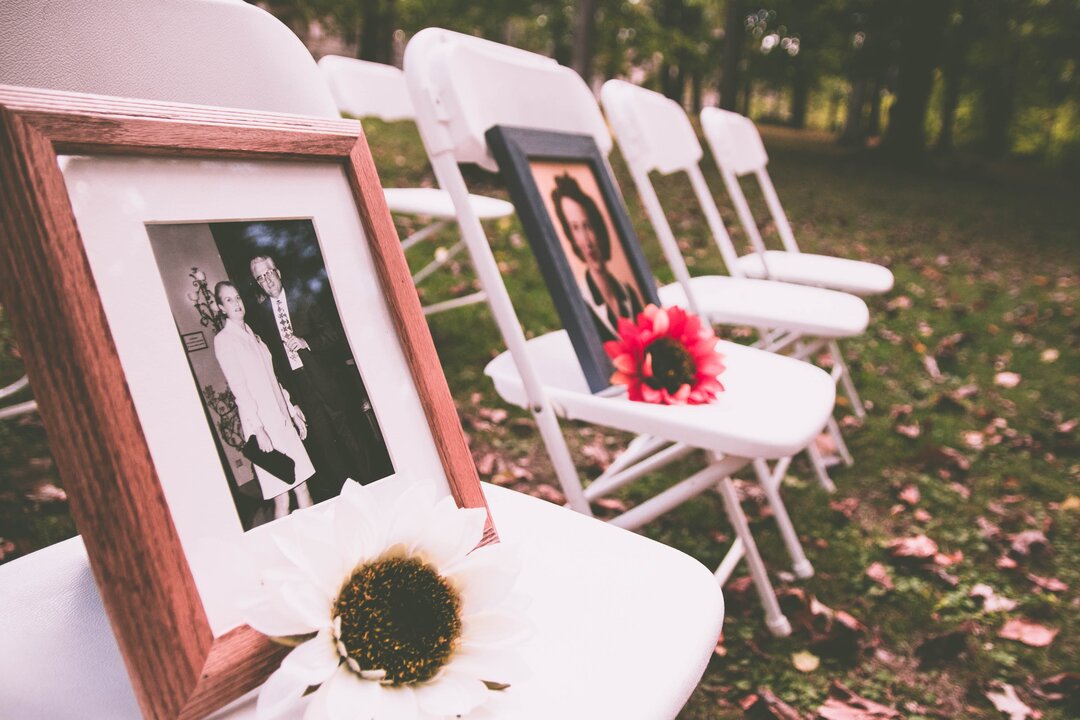- Expert advice/
- Wedding planning 101/
- Wedding planning questions/
- How to Navigate Wedding Planning in the Midst of Grief
- Wedding planning questions
How to Navigate Wedding Planning in the Midst of Grief
Your wedding day is one of the happiest in your life, but missing a loved one can make it difficult. We've partnered with Lantern to bring you expert advice on how to make this process easier.
Last updated February 5, 2024

The First Look ✨
- Not everyone grieves the same, so don’t compare your experience to others.
- Allow yourself permission to pause and grieve during the wedding planning process.
- Plan a special memorial for your loved one, whether that’s on your big day or during a pre-wedding event.
- Lantern can help connect you to grief resources before and after your special day.
Your wedding day is said to be one of the happiest times in your life, and it probably will be. After carefully planning your wedding, being surrounded by family and friends as you pledge your love is meaningful and memorable. However, your big day may be challenging if you’ve lost a loved one, no matter how long it's been since they passed. Organizing a celebratory event can seem daunting while your heart is hurting, but the right resources can help you through a difficult situation.
Relying on others, such as your partner, close friends, and a support service, is essential as you try to get through each day. It’s not advantageous to bear it all alone. That’s why we have partnered with our friends at Lantern to help our couples through difficult times. As a source of guidance for navigating life before and after a death, Lantern is lending its expertise to make a difficult process easier. From days where you feel on top of the world to times when you just can’t bear to think about your special day — and there will be some — here’s how to navigate planning your wedding while you’re experiencing grief.
Understand that everyone grieves differently.
Some folks cry, and others hold things in for days, weeks, and even years before they break down. Everyone differs in how they handle grief, as the healing process is not the same for every person. For example, your partner may be able to function as usual, while you need time to be able to do small tasks, such as grocery shopping or tackling your email inbox. Or perhaps your partner is the one that is having a more difficult time. Don’t expect your experience to be like that of others, so don’t compare or judge yourself or your partner because the grief process is different.
Realize that grieving isn’t a linear process.
The adage says that time heals all wounds, which is somewhat true, but that doesn’t mean there won’t be highs and lows as time passes. Although it would be ideal if grieving progressed on a perfect, downward slope until it disappears, that isn’t the case. Expect times when you are excited about planning your wedding and days when it’s the last thing on your mind. Certain moments may trigger strong emotions when you least expect it, and other times — say, picking out a wedding dress without your mom — may turn out ok when you thought it would be impossibly difficult.
Take space when you need it.
Wedding planning can take its toll, especially when you have a job, hobbies, and a relationship with your partner. Add grieving into your already packed life, and orchestrating your big day can all of a sudden feel incredibly daunting. There may be days when you simply can’t push through, which is ok. Allow yourself to pause or have an escape plan if needed. For example, have your partner or a friend accompany you to meetings, drive separately, and signal if you need to make a quick exit. Or have your maid-of-honor or future mother-in-law pinch hit if you can’t make a meeting. Give yourself permission to take a moment, a few hours, or a day if needed.
Plan moments to remember a lost loved one.
Many couples memorialize lost loved ones on their wedding day. It is a beautiful way to honor someone who has passed. However, that doesn’t have to be the only time you remember them. Plan to serve the person’s signature drink at your wedding shower, bachelor/bachelorette party, or rehearsal dinner. Incorporate their favorite flower into your wedding invitation. Share with others what you feel their reaction would be as you try on prospective wedding attire. Even if you do something small and private as a couple, such as toasting the person over a pre-wedding or honeymoon dinner, it can offer relief and give you something to look forward to.
Share your feelings with your partner.
Don’t grieve alone. Your partner loves you and is about to commit their life to you in front of family and friends. Rely on that fact, and be honest with them. Grief can be challenging and revealing to discuss, but having that vulnerability with your partner can create stronger bonds. Plus, it will help you understand each other better, which will help your marriage stand the test of time. Sharing emotions while planning your wedding can set a strong foundation as you prepare to enter the next phase of your relationship.
Continue being vulnerable after your wedding day.
Although wedding planning will be over after your special day — and you have your honeymoon to look forward to — continue to share your emotions and deepen your relationship after your wedding day as you get used to new spousal roles. Of course, having each other to rely on is essential, but support services are available that will help you navigate life with each other.
Whether that means grief, finances, insurance, estate planning, or whatever else, having support services available is a must. That’s where Lantern can come in to help. Let them aid you in putting the right foot forward as you plan your new chapter together as married partners.
Up next for you

How to Write a Wedding Toast: The Ultimate Guide
How-To
Wedding toasts are tricky. We’ve got some helpful tips to guide you towards a great wedding toast that you and your favorite couple will remember fondly for years, so grab your notepads and get ready for some key(note) advice.

56 Unique Wedding Memorial Ideas to Honor Loved Ones
How-To
Honor cherished memories at your wedding with thoughtful memorial ideas. Create a meaningful tribute to late loved ones on your special day.

110 Happy Anniversary Quotes to Express Your Love
Newlywed Advice
Want to wish someone a happy anniversary but unsure of how to put it into words? These anniversary quotes offer plenty of ideas to get you started.

170 Unique Love Quotes for Him
Newlywed Advice
Let him know exactly how much he means to you with these love quotes for him. From short and sweet to unique to famous, find something that fits your love perfectly.
- Expert advice/
- Wedding planning 101/
- Wedding planning questions/
- How to Navigate Wedding Planning in the Midst of Grief
Find even more wedding ideas, inspo, tips, and tricks
We’ve got wedding planning advice on everything from save the dates to wedding cakes.
